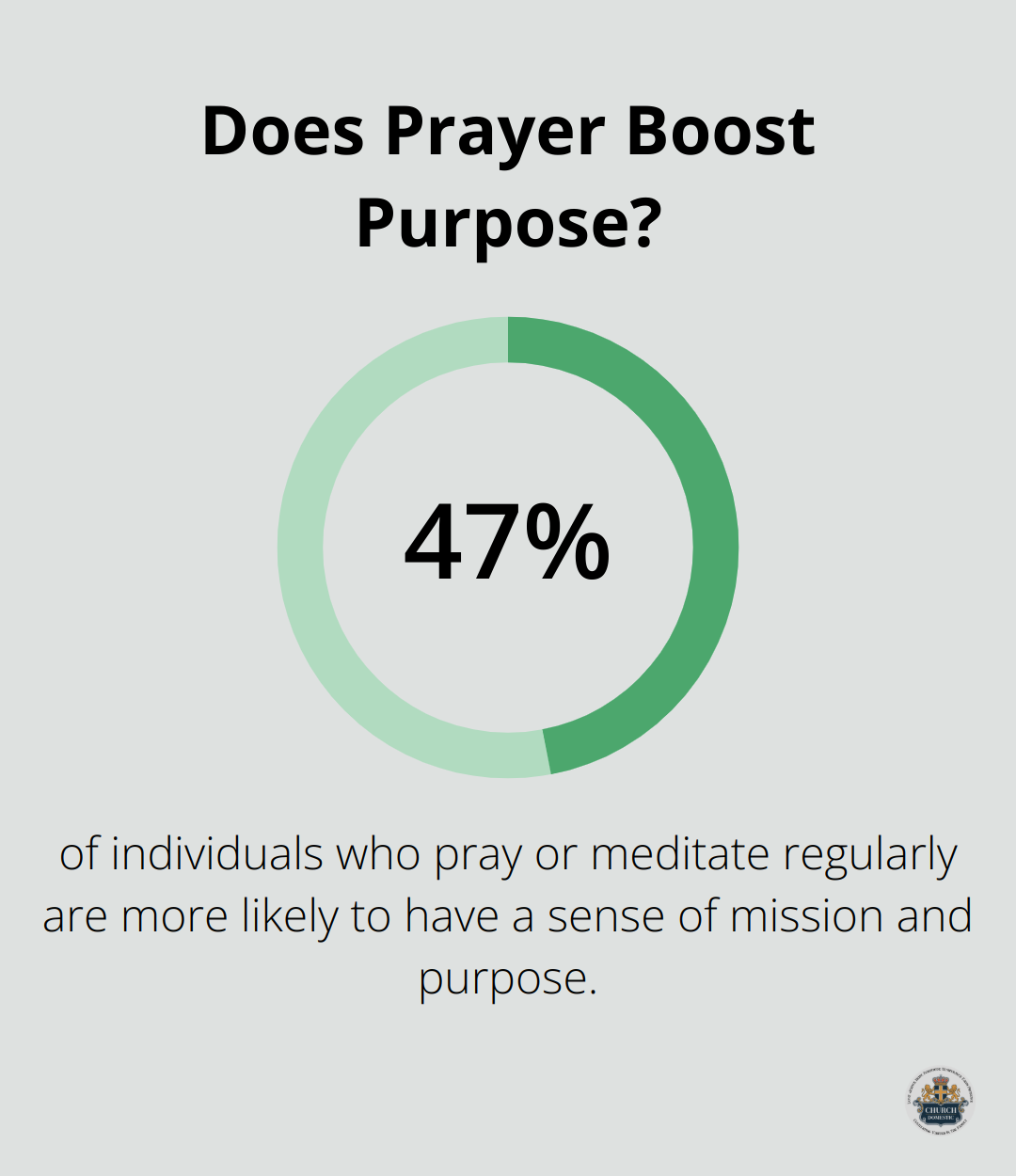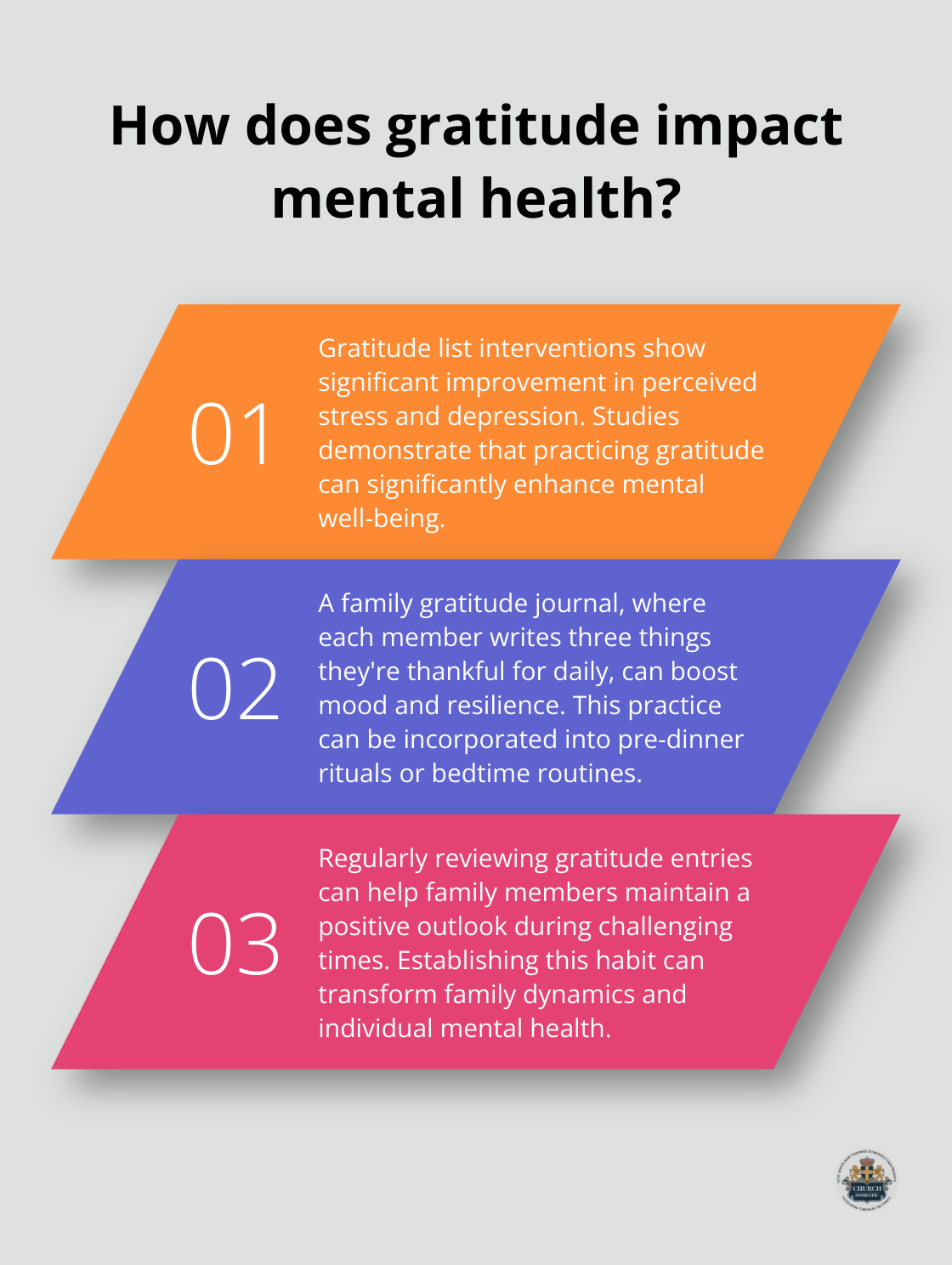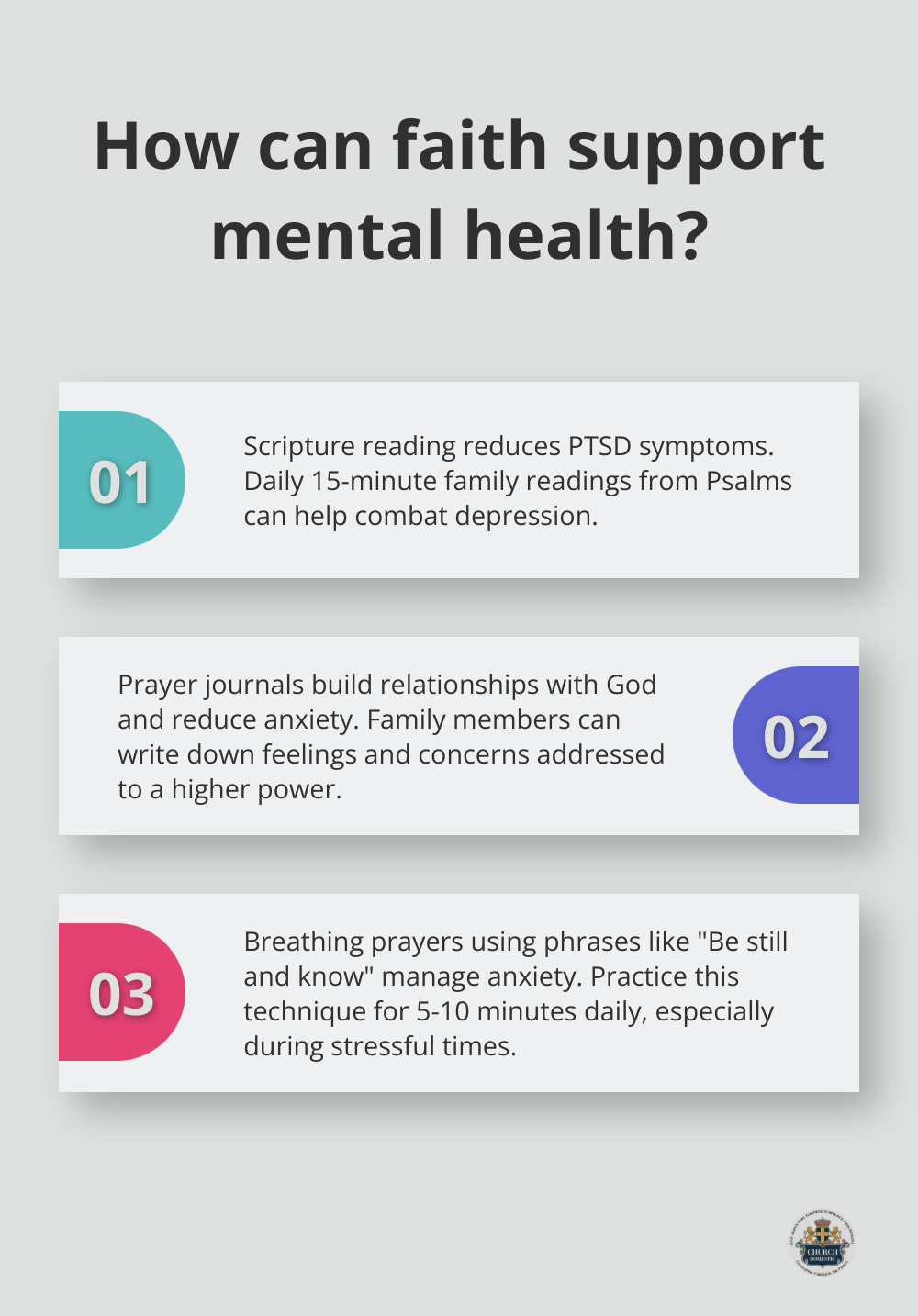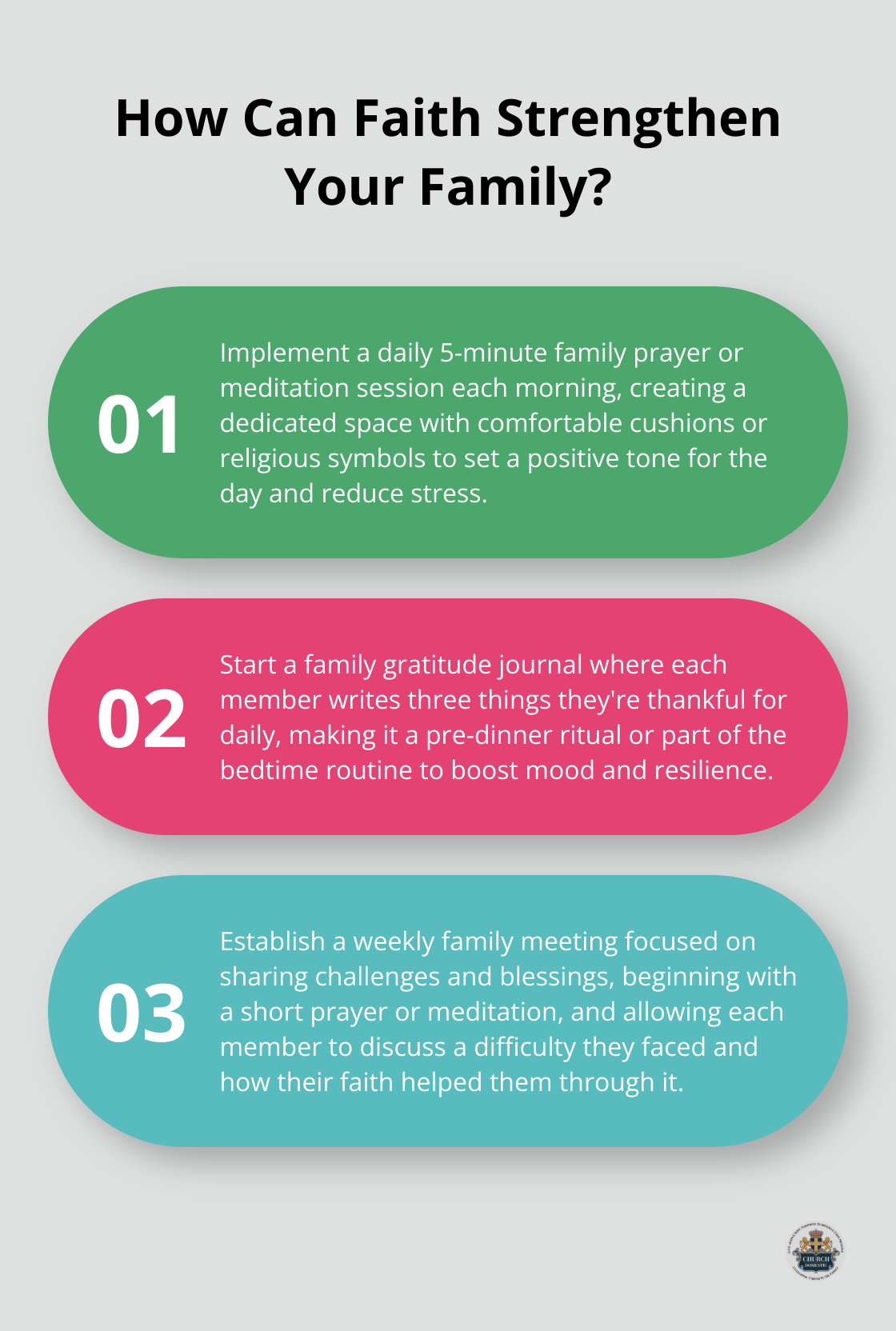At Church Domestic, we understand the profound impact faith can have on mental health within families. The connection between spiritual beliefs and psychological well-being is a topic that deserves careful exploration.
In this post, we’ll examine how faith practices can positively influence family mental health and provide practical strategies for incorporating spirituality into daily life. We’ll also discuss how faith can be a powerful tool in overcoming mental health challenges and building resilience.
Faith’s Positive Impact on Family Mental Health
The Connection Between Faith and Well-being
Faith and mental well-being share a profound and far-reaching connection. Research supports this link: a Harvard study revealed that individuals who pray or meditate regularly are 47% more likely to have a sense of mission and purpose. This statistic underscores the potential of spiritual practices to enhance family mental health significantly.
Stress Reduction Through Religious Practices
Religious practices offer powerful tools for stress and anxiety management. Daily prayer or meditation (even for just 10-20 minutes) can markedly enhance mental well-being. These practices activate the body’s relaxation response, which lowers heart rate and blood pressure. Families who incorporate these rituals into their routines often report feeling more centered and less overwhelmed by daily challenges.
The Power of Community Support
Faith communities play a vital role in providing emotional support. The National Alliance on Mental Illness reports that some people find that religion and individual spirituality have a positive impact on their physical and mental health. Participation in a religious community creates a sense of belonging and provides a support network during difficult times. This social aspect of faith can significantly contribute to overall family well-being.
Building Resilience Through Faith
Faith serves as a cornerstone for building family resilience. This resilience proves particularly important during times of crisis or major life changes, helping families navigate challenges with greater strength and hope.
Fostering Positive Family Dynamics
Religious beliefs and practices shape family functioning across cultures in significant ways. Positive correlations exist between parental religiosity and family outcomes, including lower stress levels and increased satisfaction in parenting roles. Families with strong religious beliefs often find motivation and strength in their faith during challenging circumstances, which helps to foster improved parenting practices and overall family dynamics.

The integration of faith into daily life provides families with a powerful resource for mental health and well-being. The key lies in finding practices that resonate with your family’s beliefs and consistently incorporating them into your routine. As we move forward, we’ll explore practical strategies for implementing these faith-based approaches to enhance your family’s mental well-being.
Practical Strategies for Faith-Based Family Wellness
Integrating faith into your family’s daily routine can significantly boost mental well-being. Simple spiritual practices have the power to transform family dynamics and individual mental health. Here are some practical strategies you can implement today:
Start Your Day with Intention
Begin each morning with a family prayer or meditation session. This doesn’t have to be lengthy – even five minutes can set a positive tone for the day. Create a dedicated space in your home for this practice (perhaps with comfortable cushions or meaningful religious symbols). Ask each family member to share a brief intention or gratitude statement. This ritual can reduce morning stress and foster a sense of connection.
Use Scripture as a Daily Guide
Incorporate religious teachings into your family’s routine by selecting a verse or passage to focus on each week. Display it prominently in your home, perhaps on the refrigerator or as a centerpiece on the dining table. Discuss its meaning during meals and how it applies to daily life. This practice not only provides comfort but also serves as a moral compass for decision-making and behavior.
Implement a Gratitude Journal
Establish a family gratitude journal where each member writes down three things they’re thankful for daily. Studies show that practicing gratitude can significantly improve mental health, with gratitude list interventions showing a significant improvement in perceived stress and depression. Make this a pre-dinner ritual or part of the bedtime routine. Regular review of these entries can boost mood and resilience during challenging times.
Practice Forgiveness Actively
Create a ‘forgiveness corner’ in your home where family members can leave notes apologizing or forgiving others. This physical representation of forgiveness can make the concept more tangible, especially for children. Research indicates that there is a direct association between forgiveness of family members and psychological health, especially regarding depressive symptoms. Discuss the importance of forgiveness during family meetings, using age-appropriate examples from religious teachings.
Engage in Faith-Based Service
Participate in community service activities as a family, aligning with your faith’s values. This could involve volunteering at a local food bank or participating in church outreach programs. Research shows that helping others boosts mental well-being. Try monthly service projects and discuss how these actions reflect your family’s spiritual beliefs.
Establish Tech-Free Faith Time
Designate specific times for faith-focused family activities without digital distractions. This could be a Sunday afternoon devoted to religious study or a weeknight family game with faith-based themes. Creating these tech-free zones allows for deeper connections and discussions about spiritual matters.

These strategies can significantly enhance your family’s mental well-being through faith. Consistency is key. Start with one or two practices and gradually incorporate more as they become part of your family routine. As you implement these faith-based wellness strategies, you’ll likely encounter mental health challenges that require additional support. Let’s explore how faith can play a role in overcoming these obstacles.
Faith as a Lifeline in Mental Health Struggles
Faith can serve as a powerful ally in the healing process when mental health challenges arise. Many families find strength and hope through their spiritual beliefs during difficult times. This chapter explores how faith can become a practical tool in addressing common mental health issues.
Combating Depression with Spiritual Practices
Depression often casts a dark shadow over family life, but faith-based practices offer a ray of light. Create a daily ritual of reading uplifting scripture or inspirational texts. This practice has been shown to reduce symptoms of post-traumatic stress disorder and increase forgiveness, compassion, and sense of purpose. The Book of Psalms contains many passages that resonate with those experiencing depression. Set aside 15 minutes each morning to read and reflect on these verses as a family.
Start a prayer journal. Spiritual diaries can help participants consistently look to Jesus, build a loving relationship with God and others, and progressively release fear and anxiety. Encourage each family member to write down their feelings and concerns, addressing them to God or a higher power.
Finding Peace Amidst Anxiety
Anxiety can paralyze, but faith provides tools to manage its grip. Implement a family breathing prayer practice. Choose a short, calming phrase from your religious tradition, such as “Be still and know” from Psalm 46:10. Teach your family to inhale deeply while thinking the first part (“Be still”) and exhale while thinking the second part (“and know”). Practice this for 5-10 minutes daily, especially during high-stress periods.

Create a worry box as another effective strategy. Decorate a small box together and place it in a central location in your home. Encourage family members to write down their worries on slips of paper and place them in the box. Once a week, gather as a family to pray over the worries, symbolically releasing them to a higher power.
Navigating Grief and Loss
Faith can provide a framework for understanding and coping during times of loss. Establish a family remembrance ritual for loved ones who have passed. This could involve lighting a candle, sharing a favorite memory, or preparing a meal that the person enjoyed. Tie this practice to your faith by including a prayer or reading that speaks to the hope of an afterlife or the eternal nature of the soul.
For children struggling with grief, create a memory book that incorporates elements of your faith. Include photos, drawings, and stories about the loved one, interspersed with comforting religious quotes or teachings about death and the afterlife.
Building Resilience Through Faith
Resilience plays a vital role in long-term mental health, and faith can become a cornerstone in its development. Institute a weekly family meeting focused on sharing both challenges and blessings. Begin each meeting with a short prayer or meditation, then allow each family member to discuss a difficulty they faced and how their faith helped them through it.
To further build resilience, create a family mission statement based on your spiritual values. Display this prominently in your home and refer to it during tough times as a reminder of your family’s purpose and strength.
These faith-based practices (when integrated into daily life) can create a supportive environment that nurtures mental health and emotional well-being. While faith can be a powerful tool in addressing mental health challenges, it’s important to seek professional help when needed. Faith and professional care can work hand in hand to provide comprehensive support for your family’s mental health journey.
Final Thoughts
Faith profoundly impacts family mental health, offering powerful tools to enhance well-being. The strategies we discussed provide practical ways to integrate spiritual practices into your family’s routine. These practices strengthen your spiritual connection and contribute significantly to mental health.

We encourage you to start small and gradually build these practices into your daily life. Consistency will help you reap the full benefits of faith-based approaches for mental well-being. While faith offers strength and comfort, it doesn’t replace professional mental health care when needed.
At Church Domestic, we support families in their quest for mental and spiritual well-being. Our resources offer guidance on integrating faith into family life (and personal growth). We invite you to explore our website for more insights on nurturing a healthy, faith-centered family life.